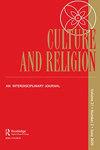Intersectional cosmopolitanism: Muslim women’s engagement with polygamy on Malaysian and Indonesian screens
IF 0.5
0 RELIGION
引用次数: 1
Abstract
ABSTRACT This article interrogates how the diverse realities of Muslim women fray the concept of ‘Muslim cosmopolitanism’ in Southeast Asia. By comparing how Malaysian Muslim women interpret polygamy in Malaysian and Indonesian screens, this article problematises the idea of a unified cosmopolitanism experienced by Muslims from the Malay world. Based on findings from interviews with 25 educated women, this article shows that media representations of polygamy and Muslim femininity can differ even between two Southeast Asian countries sharing common gendered and religious practices. It argues that the women’s understanding of polygamy is based on the intertwinement of their ethnic, gendered and classed subjectivities that are not necessarily informed by their religious beliefs per se but rather by the broader socio-political contexts in which they live. Through this embodiment of intersectional cosmopolitanism, they not only disrupt existing notions of ‘Muslim cosmopolitanism’ but highlight the heterogeneous experiences of Muslims within Southeast Asia.交叉的世界主义:马来西亚和印度尼西亚银幕上穆斯林妇女对一夫多妻制的参与
本文探讨了东南亚穆斯林妇女的多样化现实如何影响“穆斯林世界主义”的概念。本文通过比较马来西亚穆斯林女性对马来西亚和印尼银幕上一夫多妻制的解读,对马来世界穆斯林所经历的统一世界主义观念提出质疑。基于对25名受过教育的女性的采访,这篇文章表明,即使在两个拥有相同性别和宗教习俗的东南亚国家,媒体对一夫多妻制和穆斯林女性气质的描绘也可能有所不同。它认为,妇女对一夫多妻制的理解是基于她们的种族、性别和阶级主体性的相互交织,这些主体性不一定是由她们的宗教信仰本身决定的,而是由她们生活的更广泛的社会政治背景决定的。通过这种交叉世界主义的体现,他们不仅打破了现有的“穆斯林世界主义”概念,而且突出了东南亚穆斯林的异质经历。
本文章由计算机程序翻译,如有差异,请以英文原文为准。
求助全文
约1分钟内获得全文
求助全文

 求助内容:
求助内容: 应助结果提醒方式:
应助结果提醒方式:


